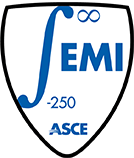Computational Geomechanics
Core competencies
- Granular micromechanics
- Computational mechanics
- Geomechanics
- Continuum and discrete modelling
- Computational multiscale modelling
- Particle morphology
- Constitutive modeling
Problems
The Computational Geomechanics Lab at HKUST aims to develop innovative theoretical and computational tools to empower our predictive capacity and capability towards thorough and deep understanding of the complicated responses of granular media subjected to different challenging conditions, including the presence of multiphase interstitial fluids, coupled mechanical, hydraulic, thermal, chemical conditions, and conditions encountered in planetary explorations.
Approach
We develop advanced multiscale and multi-physics modeling approaches to simulate and characterize quasi-static and dynamic responses of granular materials from nano- to macro- scales. Continuum approaches including FEM, MPM, Peridynamics and CFD are rigorously coupled with discrete-based approach such as DEM and Contact Dynamics to offer next-generation computational multiscale modeling tools to tackle emerging engineering challenges relevant to granular media.
Findings
Our research offers unprecedented insights into the micromechanics and microstructural mechanisms that links directly to intriguing macroscopic phenomena observed in granular media. focus on fabric structure, grain morphology, grain breakage, strain localization, and multi-physics effect. We have developed a range of novel computational tools capable to handle solid-fluid mixtures, crushable granular material, grains with complex morphology, and porous media. Many of our tools are made available to the public.
Impact
Our research has made and will continue to make interdisciplinary impacts in: (i) geotechnical engineering with reference to large deformation and failure, debris flow and landslide, and offshore geohazard, (ii) processing of granular materials and powders in mining and chemical engineering, pharmaceutical and food industries, and 3D printing), where we address challenging and critical issues related to complex grain morphology, grain breakage, hydro-/thermal-/chemical-/mechanical-coupling, and/or phase changes, and (iii) geology and planetary science where grain fragmentation and strain localization in geological formation are studied with granular mechanics.
Current members
- Shiwei Zhao (Post-doctoral Research Fellow)
- Fan Zhu (Post-doctoral Research Fellow)
- Yiqiu Zhao (Post-doctoral Research Fellow)
- Weijian Liang (Ph.D. student)
- Yong Kong (Ph.D. student)
- Amiya Prakash (Ph.D. student)
- Ke Shi (Ph.D. student)
- Tao Yu (Ph.D. student)
- Quan Ku (Ph.D. student)
- Terry Leung (M.Phil. student)
- Recent Graduates
- Fan Zhu (Ph.D.)
- Zhijie Yu (M.Phil.)
- Xingyue Li (Ph.D.)
- Huanran Wu (Ph.D.)
Funding agencies
- Research Grants Council of Hong Kong
- Natural Science Foundation of China
- Australian Research Council
- Croucher Foundation
- K.C. Wong Education Foundation


